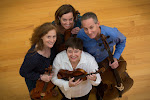Monday, July 1, 2013
The Magic of Outreach Concerts
It's the start of summer! Like so many families, organizations or other groups at the end of a season, we Serafins were engaged in some planning for the next season recently. We are excited about so many upcoming concerts, some of them are special "outreach" concerts and I thought it would be a good time to talk about what that actually means as its an important movement in classical programming these days.
If you've never been to an outreach concert (sometimes called interactive, maybe even educational outreach or depending on the audience "family" concert) it means that we performers will be trying to engage the audience beyond just sharing beautiful music. Everyone in the quartet has engaged in different types of these performances. It could be as simple as talking to the audience about who we are, showcasing each instrument alone briefly if (usually younger) audiences aren't familiar with each instrument. It could be quite musicological or theoretical, like a concert we recently played at Dickinson College where we spoke of the structure of our Beethoven op 132 quartet, breaking down sections, playing motives and counter motives in isolation and showing how themes transform throughout movements. This was for a class with some prior background in musical history and theory. For another outreach event, we got a little more abstract, engaging with a poetry class and hearing the aspects of rhythm, meter, syntax or even phonetic artistry they were relating to in our music. Here it's really important to note part of the magic of outreach concerts: they are a two way street! We in the quartet are so inspired by our new knowledge of audience perceptions that it changes how we play! Hearing how the audience responds to a particular phrase, or sound heightens our own awareness of that element and colours our feelings about it when we play.
Of course the idea of pre-concert lectures is nothing new, but an exciting aspect of many new outreach performances is that they try to engage listeners with multiple intelligences, not just analyzing the piece or providing a historical framework, but actually getting audience members to use their own musical skills to experience important elements in the piece they are about to hear. They might use clapping to experiment with rhythms, or conduct expressively, sing through some motives or direct harmonies. In other words, audience members get to improvise musically, guided by the musicians to get a thrilling sense of what it might feel like to create music. This new brand of outreach concerts is the subject of my dissertation and I'm thrilled to be playing in a group where every musician is up for experimenting with different kinds of concerts. Of course, we also will always love the traditional kind of concerts. To me personally, the music we play is often so deified in my mind that it deserves only the most holy temple, a concert environment of stillness and absolute simplicity to frame the piece.
So, dear readers/audience, I would love to hear from you: have you ever been to an outreach concert that was meaningful to you? What different experiences have you had beyond traditional types of concerts? Come talk to us after a concert and maybe you can be part of our planning sessions in the future.
Til next time,
Esme
Subscribe to:
Post Comments (Atom)


No comments:
Post a Comment